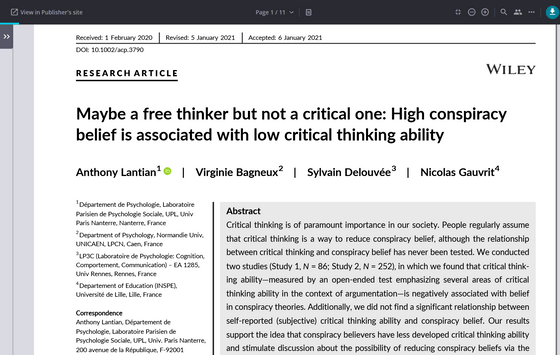Research results show that people who believe in conspiracy theory have lower critical thinking ability

The reason why people believe in 'conspiracy theory', which thinks that there is a mighty organization or plot behind a specific event, is '
Maybe a free thinker but not a critical one: High conspiracy belief is associated with low critical thinking ability --Lantian --2021 --Applied Cognitive Psychology --Wiley Online Library
https://onlinelibrary.wiley.com/doi/epdf/10.1002/acp.3790

Belief in Conspiracies Tied to Lower Critical Thinking Skills, But Don't Get Smug
New study indicates conspiracy theory believers have less developed critical thinking abilities
https://www.psypost.org/2021/07/new-study-indicates-conspiracy-theory-believers-have-less-developed-critical-thinking-ability-61347
Anthony Lantian and colleagues at the University of Paris Nanterre, who conducted the study, quoted the University of Illinois philosopher Ennis, RH as saying 'what to believe and what to do' about critical thinking. Defined as 'reasonable and introspective thinking with a focus on making decisions.' The research team conducted the 'Ennis-Weir Critical Thinking Essay Test, ' a test that evaluates critical thinking for 338 undergraduate students, and then asked the undergraduate students about their perceptions of conspiracy theory, and how they self-think critical thinking. I checked if I would like to evaluate it.
As a result of the investigation, it was found that the more people who believe in conspiracy theory, the worse the results of the critical thinking test. On the other hand, the self-assessment of the subjective critical thinking of those who believe in conspiracy theory did not affect 'whether or not it is easy to believe in conspiracy theory.' 'This is inconsistent with the conspiracy theorists who claim they are'critical thinkers',' Rantian and colleagues argued.

The relationship between critical thinking and conspiracy theory has long been the subject of research. Professor Emeritus Barbara K. Hofer of Middlebury College's Department of Psychology and Professor Gale Sinatra of the Department of Educational Psychology at the University of South California tend to have a confirmation bias towards those who advocate unscientific content theory with conspiracy theory. They tend to think in the dualism of 'right or wrong', 'recognize that others, or yourself, may be in contact with science in the wrong way.' 'Think and infer for yourself.' If you have the time, you can throw away the conclusional reasoning and accept new information. '
What are the five psychological challenges that cause scientific distrust? --GIGAZINE

Related Posts:
in Posted by log1p_kr






